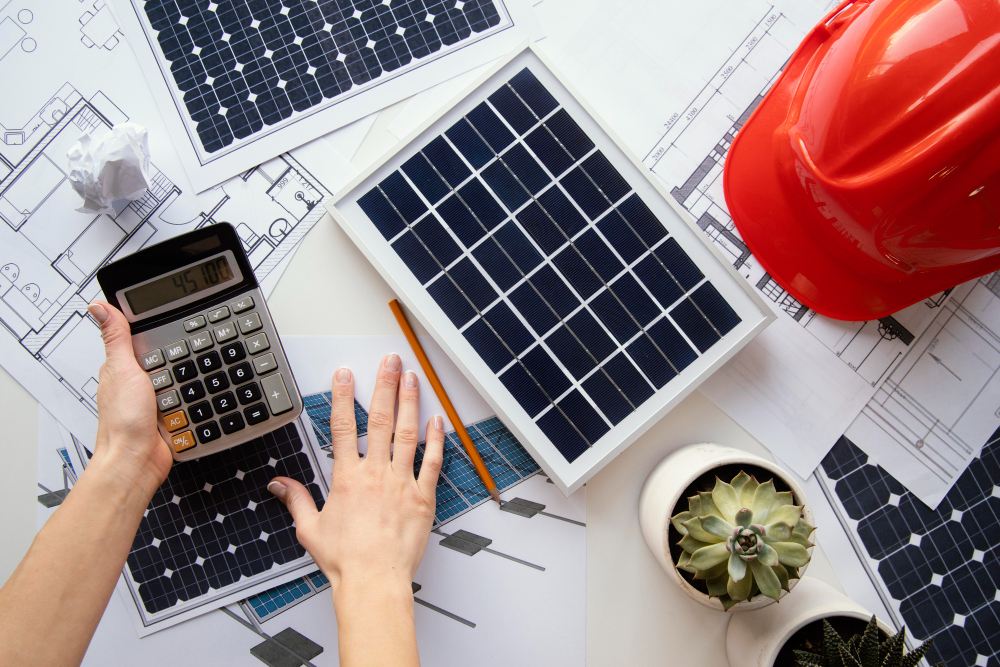5 Important Tips For Your Solar Project
Solar energy is an excellent sustainable alternative for generating electricity in residential projects, and the solar project has several advantages, such as cost reduction, lower environmental impact, and energy independence.
To ensure the success of the project, it is important to pay attention to all steps of the process, from sizing to customer guidance on maintenance and technical support.

1. How to scale the Solar Project
In order to calculate the solar energy needed for a solar project, several factors need to be considered. These include the radiation and irradiance levels at the project location, the size and specifications of the photovoltaic system, the power output, and the type of solar panel being used. Additionally, it is crucial to properly size the energy storage system by selecting an appropriate battery and determining its storage capacity.
System sizing must take into account site specifics, such as roof orientation and slope, shadows that may affect power generation, space availability, and energy consumption.
It is essential to carry out a detailed technical inspection to verify that the location is ideal for installing the solar system and to guarantee the roof’s support capacity and the absence of shadows.
After dimensioning and technical inspection, it is necessary to homologate the system with the electricity concessionaire. During the installation process, it is crucial to correctly follow all preceding steps in order to ensure the system’s efficiency and safety.
Upon project completion, it is important to deliver the system to the customer while providing them with thorough instructions regarding the next steps. This includes information on how to adjust the settings, warranty coverage duration, as well as any potential maintenance requirements and technical support available for the photovoltaic system.
2. How to choose the Best Solar Panel type
Solar panels come in various types, each offering its own set of advantages and disadvantages. The selection process depends on several factors such as budget, location, climate, and energy efficiency objectives.
It is advisable to seek assistance from a solar energy specialist who can guide you in choosing the most suitable solar panel type for your project. In general, there are three main types of solar panels commonly used for residential purposes:
- Crystalline silicon panels: most common and efficient currently available on the market. They are made with silicon cells that convert sunlight into electricity.
- Thin Film Panels: Lighter and more flexible than crystalline silicon panels, they can be used on curved surfaces or where space is limited. So, they are less efficient and have a shorter lifespan.
- Hybrid panels: a combination of different technologies. They perform better than thin-film panels and are lighter and more flexible than crystalline silicon panels.
3. How to position the Solar Panels in the House
When installing solar panels in homes, it is crucial to adhere to some fundamental guidelines. Firstly, it is important to select a position that receives the maximum amount of direct sunlight, ideally on a south-facing roof (in the northern hemisphere) or a north-facing roof (in the southern hemisphere).
The optimal inclination for solar panels is typically between 30 and 45 degrees relative to the horizontal plane. However, if the roof lacks this inclination, adjustments can be made to position the panels appropriately. Additionally, it is essential to avoid any obstructions that could cast frequent shadows, such as nearby trees or buildings. Lastly, to ensure both safety and quality installation, it is vital to engage a specialized professional.
By following these precautions throughout the solar project, it is possible to achieve maximum efficiency through strategic positioning of the solar panels, ultimately ensuring customer satisfaction.
4. How to ensure the Safety and Security of the solar project
To ensure the safety and security of a solar energy system in a solar project, it is important to pay attention to each step. Including some important precautions that can, for example:
- Check that the roof structure is capable of supporting the weight of the solar panels and that it is in good condition;
- Carry out the installation of the panels and the electrical system following the standards and technical recommendations to avoid risks of electric shock or fire;
- Use quality and certified materials and equipment;
- Install protective devices against electrical surges and proper grounding systems;
- Periodically maintain the system to ensure its safe and efficient operation;
- Include warning signs or signs to warn of the presence of the solar system and possible electrical hazards.
In addition, it is important to have the assistance of a trained professional and a reliable company to carry out the project and installation of the residential solar project, thus guaranteeing the quality and safety of the system.
5. How to deal with Solar Energy System Maintenance
To ensure the proper functioning and efficiency of the solar energy system in a residential project, it is important to carry out periodic maintenance. Some of the measures that can be taken include:
- Regularly clean the solar panels to remove dust, dirt and other debris that could reduce the efficiency of the system;
- Periodically check the condition of cables and electrical connections, and repair or replace if there is any damage or malfunction;
- Check the status of system components, such as inverters, batteries and charge controllers, and perform maintenance or replacement if necessary;
- Monitor system performance to identify any problems or drops in solar energy production;
- Maintain system maintenance and performance records to facilitate problem identification and future maintenance planning.
Conclusion
It is important to have the assistance of a trained professional to carry out the maintenance of the residential solar project. Remembering that each solar project and client is unique and needs personalized service. Regular maintenance is critical to ensure efficiency and extend system life.







